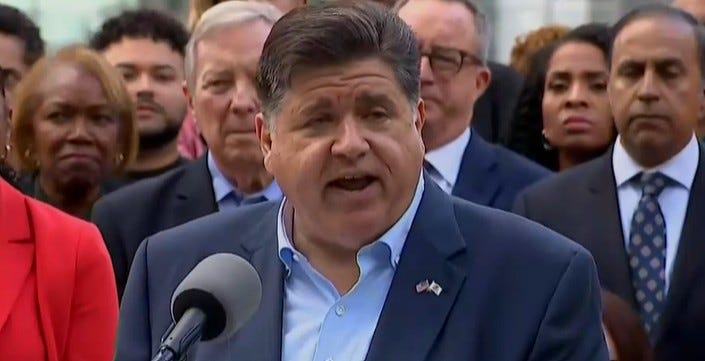Trump Handed A Big Defeat In His War On Chicago
A three-judge federal panel upheld an earlier ruling that blocks Donald Trump from deploying National Guard troops in Chicago.
Donald Trump has taken a lot of defeats in his war against the American people. Trump lost the battle of Los Angeles. Trump’s troops are being mocked and danced at in Portland. Washington, DC, essentially shut down due to Trump’s deployment.
Since the White House has been converted into a tireless propaganda machine, what they are saying about their efforts is much more Baghdad Bob than Walter Cronkite.
The Daily is outside the Beltway journalism for the people. Please support our work by becoming a subscriber.
Trump has also been losing in the courts.
Just days ago, a federal judge granted a temporary restraining order blocking the president from deploying the National Guard in Chicago.
The administration appealed, and a three-judge federal panel consisting of a Trump appointee, an Obama appointee, and a George H.W. Bush appointee unanimously wrote in their decision:
Although we substantially agree with the definition of rebellion set forth by the district court in Newsom, we emphasize that the critical analysis of a “rebellion” centers on the nature of the resistance to governmental authority. Political opposition is not rebellion. A protest does not become a rebellion merely because the protestors advocate for myriad legal or policy changes, are well organized, call for significant changes to the structure of the U.S. government, use civil disobedience as a form of protest, or exercise their Second Amendment right to carry firearms as the law currently allows. Nor does a protest become a rebellion merely because of sporadic and isolated incidents of unlawful activity or even violence committed by rogue participants in the protest. Such conduct exceeds the scope of the First Amendment, of course, and law enforcement has apprehended the perpetrators accordingly. But because rebellions at least use deliberate, organized violence to resist governmental authority, the problematic incidents in this record clearly fall within the considerable daylight between protected speech and rebellion.
Applying our tentative understanding of “rebellion” to the district court’s factual findings, and even after affording great deference to the President’s evaluation of the circumstances, we see insufficient evidence of a rebellion or danger of rebellion in Illinois. The spirited, sustained, and occasionally violent actions of demonstrators in protest of the federal government’s immigration policies and actions, without more, does not give rise to a danger of rebellion against the government’s authority. The administration thus has not demonstrated that it is likely to succeed on this issue.
The worst was yet to come for Trump.




